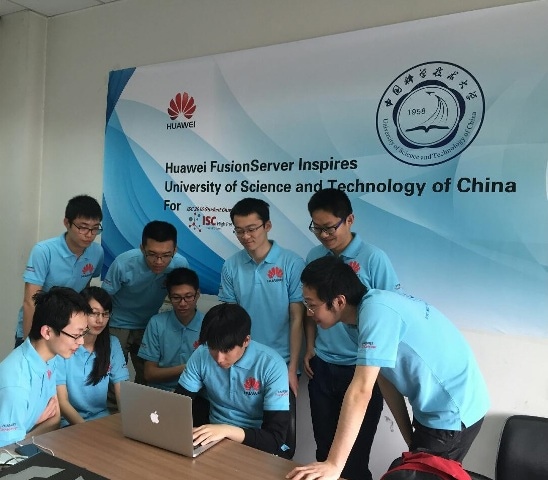Huawei Powers USTC at incoming ISC 2016 Student Cluster Competition
[Shenzhen, China, April 28, 2016] The University of Science and Technology of China (USTC) has chosen Huawei’s high-performance computing (HPC) solutions in this year’s ISC Student Cluster Competition (ISC-SCC). The USTC team will join 11 others from all over the world from June 21-23 in Frankfurt, Germany.
Co-organized by the HPC Advisory Council (HPCAC) for the International Supercomputing Conference (ISC), the Student Cluster Competition challenges teams to design, build, and demonstrate high-performance cluster hardware and software in real time across a series of benchmarks and applications. One of the two most prestigious events in the field and nicknamed the HPC Olympics, this event is designed to introduce the next generation of students to the HPC world and community, while offering leading solution providers a platform to showcase their innovations in technology.
This year's USTC six-member team is made up of second- and third-year students from the School of Computer Science and Technology. They will be fully supported by Huawei technical experts, who will guide them in the cluster design and system tuning using HPC solutions.

USTC students guided by Huawei HPC expert
The USTC team will make use of Huawei’s HPC solutions to design and set up their clusters with FusionServer high-density and rack servers, high performance GPU cards and high-speed Infiniband networks. The competition rules limit the power consumed by the HPC cluster equipment to 3000 W when running the Linpack and HPCC benchmarks and five specified parallel applications to test software performance and power optimization. These parallel applications range across practical applied science, engineering, and big data, and demand different hardware computing resources and software environments. In this intense challenge for hardware vendors and computing students, teams must optimize and debug their systems at multiple algorithm, database, compilation, and operational levels to ensure robustness for different test cases.
USTC team leader and Professor of Department of Computer Science, Hong An said, "Huawei is a leading IT enterprise that embodies continuous innovation and open collaboration. We share the same commitment to world-class education and cultivation of future talent. We are honored to have Huawei on board this year to show the world our computing prowess. "
Huawei is a veteran in the HPC and server fields and offers a powerful diversity of FusionServer solutions to cater to CPU computing-, acceleration-, and memory computing-intensive demands. Huawei’s full-coverage solutions provide cooling at both the cabinet and blade module levels to push computing performance to the limits, while significantly reducing energy consumption of large computing clusters and data centers.
Huawei leverages its HPC experience in the fields of manufacturing, education, and scientific research to provide its customers with the optimal integrated software and hardware solutions. Satisfied customers include top car makers like Volkswagen as well as world-class institutions the University of Toronto, Newcastle University, and Sweden’s Uppsala University. The Poznan Supercomputing and Networking Center in Poland is a leading research institute in strategic partnership with Huawei, with a joint innovation center and long-term, stable technical cooperation.

